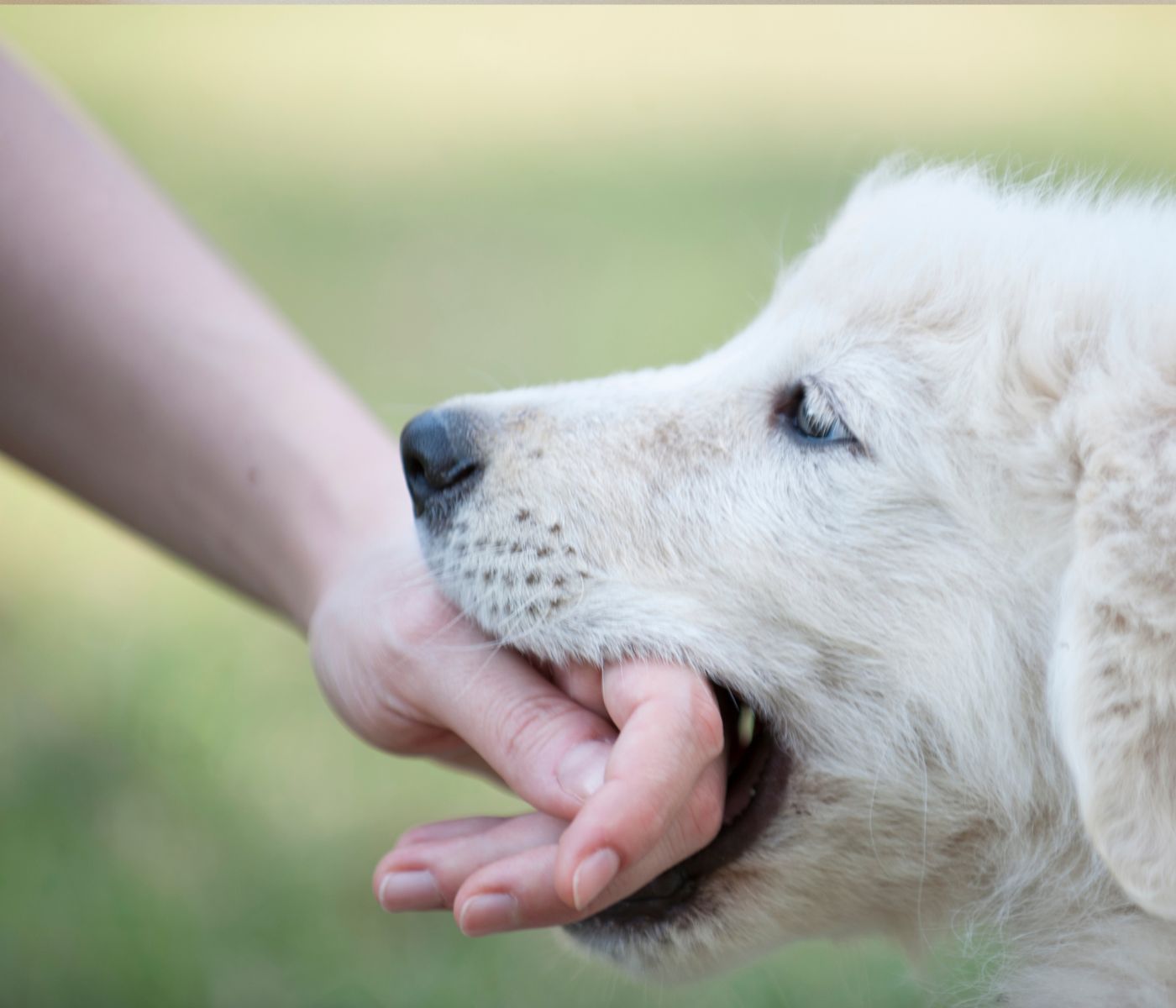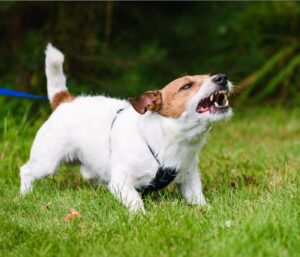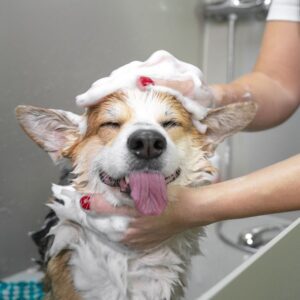Introduction
If you have an 8-month old puppy that keeps biting, you’re probably wondering why and what you can do about it. In this blog post, we’ll explore some of the reasons puppies bite and offer some tips on how to get them to stop.
Puppies bite for a variety of reasons, including teething, boredom, and playing. However, insufficient training is often the root cause of this behavior.
To get your puppy to stop biting, you’ll need to be patient and consistent with your efforts. But with a little time and patience, you can have a well-behaved pup in no time!
Why Does my 8-Month Old Puppy Keep Biting?

Teething
Teething is the most common reason for puppies to bite. As their teeth start to come in, they may chew on anything they can get their mouths on to relieve the discomfort.
If you have ever had a toothache, you know how painful it can be! Imagine having 20+ teeth all coming in at once.
Ouch! Puppies will usually start teething around 3 months of age and will continue until they are 6-7 months old.
To help ease their discomfort, make sure to provide them with plenty of chew toys and bones.
Encouraging the action

Encouraging the action, either through play or rewards, can also lead to biting.
If you accidentally encourage your puppy to bite by playing too rough with them or using items such as stuffed animals or rope toys that promote chewing, they may think that this type of behavior is acceptable.
Similarly, if you give your puppy attention or treats when they bite, they may learn that this is a good way to get what they want from you.
Boredom

Boredom can also cause puppies to bite out of frustration. If a puppy isn’t given enough exercise or mental stimulation throughout the day, they may become bored and antsy, leading them to mouth and chew on things they shouldn’t.
This is often seen in puppies who are left alone for long periods of time without anything to do.
Playing
Puppies often play by biting each other’s necks and mouths. This is normal behavior and helps them learn how much pressure they can use without hurting another animal.
If your puppy is constantly biting you while playing, try redirecting their energies onto a toy or bone instead.
Insufficient Training
One reason why your 8-month old puppy might be biting could be because they have not been properly trained not to do so.
It is important to start training your puppy as soon as possible so that they know what behaviors are acceptable and which ones are not.
How to Get my 8-Month Old Puppy to Stop Biting?

There are several things you can do to stop your puppy from biting:
–Provide your puppy with plenty of chew toys and bones to gnaw on;
-Discourage rough play;
-Be consistent with your commands;
-Do not punish your puppy for biting, but instead redirect their attention to a toy or bone;
-Socialize your puppy early and often so that they learn how to interact appropriate with other dogs and people.
Other tips:
Don’t support the behavior
The first and most important thing you can do to stop your puppy’s biting is to not encourage it. This means no playing games like “tug-of-war” or “keep away” that involve your puppy biting and pulling on your hands or clothes.
It also means not giving your puppy attention – whether positive or negative – when he bites. This includes scolding or punishing him, as this can often be misinterpreted by puppies as attention and actually reinforce the biting behavior.
If you consistently ignore your puppy when he bites, he will eventually learn that this is not a way to get your attention and will stop doing it.
Distractions
If your puppy does start to bite, provide him with an alternative object to chew on such as a toy or bone. Praise him lavishly when he takes the object in his mouth instead of your hand.
If he does not have a toy handy, you can try using a food treat as a distraction; for example, hold a treat in front of his nose so that he has to take it from you gently in order to eat it.
Exercise
One common reason puppies bite is because they are full of energy and need an outlet for their excess pent-up energy.
Make sure your puppy is getting enough exercise through regular walks, runs, or play sessions both inside and outside the house.
A tired dog is much less likely to want to bite than one who hasn’t had enough exercise during the day.
Be patient with the dog
Remember that puppies are still learning how to control their mouths and jaws and it will take time for them to learn not to bite too hard.
So be patient with your pup while he’s still learning and don’t get frustrated if he has setbacks along the way – just keep working on it patiently and consistently and eventually he’ll get there!
How to Redirect your Puppy’s Biting?
If your puppy does start to bite, it’s important to redirect his attention away from whatever it is he’s trying to bite. This could mean saying “no” firmly and then offering him a toy or treat instead.
You may also need to physically move him away from whatever it is he’s trying to bite; for example, if he’s biting your hand, you could gently push him away and offer him a chew toy instead.
It’s Important not to punish your puppy for biting; this could only make the problem worse by making him scared or anxious around you. Instead, focus on redirecting his attention and rewarding him when he stops biting.
With time and patience, you should be able to train your pup not to bite!
FAQs
Q: Is it normal for an 8 month old puppy to bite?
A: While it is common for puppies to mouth and nip during play, it’s important to make sure your puppy knows that biting is not acceptable behavior.
Puppies do bite out of excitement, frustration or insufficient training. However you can patiently train your dog to stop biting.
Q: What age should a puppy stop biting?
A: Generally, puppies will outgrow the mouthing and nipping stage by the time they are around 9-10 months old. However, if your puppy is still biting after this age, it could be indicative of a larger problem such as separation anxiety or aggression.
If your puppy continues to bite after 10 months of age, it’s best to consult with a professional trainer or behaviorist.
Q: Should you punish your dog for biting?
A: No, you should not punish your dog for biting. Punishment will only serve to make your dog afraid of you and could increase any underlying anxiety or aggression issues.
Instead, focus on positive reinforcement training ( rewarding your dog for good behavior) and providing plenty of chew toys and bones for your pup to gnaw on.
Q: At what age are puppies the hardest?
A: The “puppy stage” can be tough for owners, but rest assured that it won’t last forever! Typically, puppies go through a phase of mouthing and nipping between the ages of 8-10 months old. After this phase ends, most pups will have outgrown their chewing habits altogether.
Q: Why does my dog bite my hands when I pet her?
A: It’s possible that your dog is feeling overstimulated and is trying to communicate this to you by licking or nibbling at your hand. Dogs often use their mouths as a way to explore their environment, so it’s also possible that she simply doesn’t realize that her teeth can hurt you.
In either case, try redirecting her attention with a toy or bone before she has a chance to start chewing on your hand.
Final thoughts?
It’s normal for puppies to mouth and bite things, including people. But it’s important to teach your puppy that biting is not acceptable behavior.
By providing appropriate outlets for your puppy’s energy, supervising closely, and being consistent with training, you can help your puppy learn to control his biting.
Here are a few final thoughts on why your 8-month old puppy might be biting and how you can stop it:
Puppies mouth and bite things as they’re exploring the world and learning about their environment. This is perfectly normal behavior and usually isn’t anything to worry about.
However, if your puppy is biting people excessively, it’s important to intervene and train him to stop this behavior.
Excessive biting can lead to serious injuries, both for the person being bitten and for the dog himself (if he bites someone too hard and they retaliate).
There are several reasons why puppies bite, including teething, boredom, playing, or insufficient training. It’s important to figure out what’s causing your puppy to bite so that you can address the issue appropriately.
There are several things you can do to stop your puppy from biting, including distracting him with toys or treats, exercising him so that he’s tired out before playtime, and being patient while he learns what is acceptable behavior.
If you have any further questions about why your 8-month old puppy might be biting or how to stop it, please consult with a qualified veterinarian or animal behaviorist for more advice.




